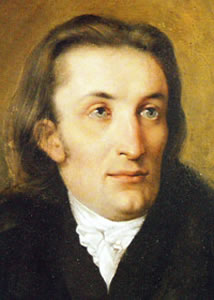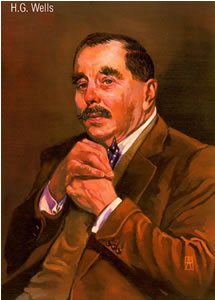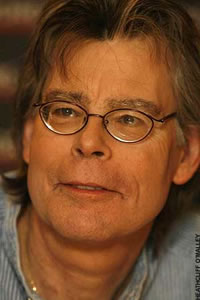De Canadese dichter, folk singer-songwriter en schrijver Leonard Cohen werd geboren op 21 september 1934 te Montréal. Zie ook mijn blog van 21 september 2007.
Do not forget old friends
Do not forget old friends
you knew long before I met you
the times I know nothing about
being someone
who lives by himself
and only visits you on a raid
When this American woman
When this American woman,
whose thighs are bound in casual red cloth,
comes thundering past my sitting place
like a forest-burning Mongol tribe,
the city is ravished
and brittle buildings of a hundred years
splash into the street;
and my eyes are burnt
for the embroidered Chinese girls,
already old,
and so small between the thin pines
on these enormous landscapes,
that if you turn your head
they are lost for hours.
I perceived the outline of your breasts
I perceived the outline of your breasts
through your Hallowe’en costume
I knew you were falling in love with me
because no other man could perceive
the advance of your bosom into his imagination
It was a rupture of your unusual modesty
for me and me alone
through which you impressed upon my shapeless hunger
the incomparable and final outline of your breasts
like two deep fossil shells
which remained all night long and probably forever

Leonard Cohen (Montréal, 21 september 1934)
De Duitse dichter Johann Peter Eckermann werd geboren op 21 september 1792 in Winsen (Luhe). Hij was bovenal de medewerker en vriend van J
ohann Wolfgang von Goethe. Zie ook mijn blog van 21 september 2007.
Tisch-Lied
Zur Feier des 28. August 1826.
(Goethes Geburtstag.)
Wenn den Meister hoch zu feiern
Heute schon manch Lied erklang,
Und von vielgeübten Leyern
Tönte lieblicher Gesang;
Will auch ich mein Liedchen bringen,
Gleicher Kräfte mir bewusst;
Lebe hoch vor allen Dingen
Süßer Wonnemond August!
Dichter, die vor uns gekommen,
Nannten Wonnemond den Mai;
Bleib’ es ihnen unbenommen,
Aber wir sind nicht dabei;
Denn wir wissen, was wir sagen,
Schön’rer Dinge uns bewusst:
Darum hoch vor allen Tagen,
Achtundzwanzigster August!
Ach, was wäre doch das Leben,
Säßen da wir ohne Wein!
Drum wer uns den Saft der Reben
Gibt, er soll gepriesen sein.
Und so lasset denn erschallen
Gläserklang zu heitrer Lust,
Und so lebe hoch vor allen
Süßer Traubenmond August!
Doch was hätten wir vom Weine,
Säßen da wir still und stumm!
Darum abermals das eine
Wend ich wiederum herum:
Und so sag’ ich, dass die Lieder
Zu dem Wein die höchste Lust;
Und so sag’ ich, lebe wieder
Achtundzwanzigster August!
Schöner Tag, der uns den Meister
Deutscher Lieder hold gesandt;
Der den edelsten der Geister
Deutschem Boden treu verband.
Du vor allen andern Festen
Jedes Guten höchste Lust!
Immer hoch von allen Besten
Achtundzwanzigster August!

Johann Peter Eckermann (21 september 1792 – 3 december 1854)
De Britse schrijver Herbert George Wells werd geboren op 21 september 1866 in Bromley, Kent. Zie ook mijn blog van 21 september 2007.
Uit: God the Invisible King
“God comes we know not whence, into the conflict of life. He works in men and through men. He is a spirit, a single spirit and a single person; he has begun and he will never end. He is the immortal part and leader of mankind. He has motives, he has characteristics, he has an aim. He is by our poor scales of measurement boundless love, boundless courage, boundless generosity. He is thought and a steadfast will. He is our friend and brother and the light of the world. That briefly is the belief of the modern mind with regard to God. There is no very novel idea about this God, unless it be the idea that he had a beginning. This is the God that men have sought and found in all ages, as God or as the Messiah or the Saviour. The finding of him is salvation from the purposelessness of life. The new religion has but disentangled the idea of him from the absolutes and infinities and mysteries of the Christian theologians; from mythological virgin births and the cosmogonies and intellectual pretentiousness of a vanished age.
Modern religion appeals to no revelation, no authoritative teaching, no mystery. The statement it makes is, it declares, a mere statement of what we may all perceive and experience. We all live in the storm of life, we all find our understandings limited by the Veiled Being; if we seek salvation and search within for God, presently we find him. All this is in the nature of things. If every one who perceives and states it were to be instantly killed and blotted out, presently other people would find their way to the same conclusions; and so on again and again. To this all true religion, casting aside its hulls of misconception, must ultimately come. To it indeed much religion is already coming. Christian thought struggles towards it, with the millstones of Syrian theology and an outrageous mythology of incarnation and resurrection about its neck. When at last our present bench of bishops join the early fathers of the church in heaven there will be, I fear, a note of reproach in their greeting of the ingenious person who saddled them with OMNIPOTENS. Still more disastrous for them has been the virgin birth, with the terrible fascination of its detail for unpoetic minds. How rich is the literature of authoritative Christianity with decisions upon the continuing virginity of Mary and the virginity of Joseph–ideas that first arose in Arabia as a Moslem gloss upon Christianity–and how little have these peepings and pryings to do with the needs of the heart and the finding of God!
Within the last few years there have been a score or so of such volumes as that recently compiled by Dr. Foakes Jackson, entitled “The Faith and the War,” a volume in which the curious reader may contemplate deans and canons, divines and church dignitaries, men intelligent and enquiring and religiously disposed, all lying like overladen camels, panting under this load of obsolete theological responsibility, groaning great articles, outside the needle`s eye that leads to God.”

H. G. Wells (21 september 1866 – 13 augustus 1946)
Portret door Alan Phillips
De Amerikaanse schrijver Stephen Edwin King werd geboren in Portland, Maine, op 21 september 1947. King begon al vroeg met schrijven. Rond zijn 13e jaar vond hij een doos met oude boeken van zijn vader in het huis van zijn tante, meest horror en sciencefiction. Hij was direct verslingerd aan deze genres.Van 1966 tot 1970 studeerde King Engels aan de universiteit van Maine. Daar schreef hij een column in de schoolkrant getiteld King’s Garbage Truck. Op de universiteit ontmoette hij ook Tabitha Spruce, met wie hij in 1971 trouwde. King werkte in allerlei baantjes om zijn studie te kunnen betalen.
Na zijn universitaire studies te hebben afgesloten met de titel Bachelor of Science in English en het certificaat om op middelbare scholen les te mogen geven, nam hij een baan als leraar Engels op een school in Hampden (Main). Gedurende deze tijd woonden hij en zijn gezin in een camper. Het was soms moeilijk de eindjes aan elkaar te knopen, en het geld dat verdiend werd met korte verhalen die gepubliceerd werden in tijdschriften voor mannen kwam zeer van pas. King kreeg ook een drankprobleem, iets waar hij meer dan 10 jaar mee heeft geworsteld.
Tijdens deze periode begon King met een aantal verhalen. Een daarvan ging over een jong meisje met bovennatuurlijke krachten. Omdat het verhaal hem frustreerde, gooide King het weg. Later kwam hij er achter dat Tabitha het verhaal had gevonden en uit de vuilnisbak had gehaald, ze haalde hem over om het af te maken onder de naam Carrie. Hij stuurde het verhaal naar een vriend bij een uitgeverij en vergat het toen min of meer. Enige tijd later ontving hij een aanbod met een voorschot van $2500,00, wat zelfs in die tijd niet een bijzonder hoog bedrag was. Jaren later werden de paperback rechten verkocht voor $400.000,00.
Uit: Bag of Bones
“On a very hot day in August of 1994, my wife told me she was going down to the Derry Rite Aid to pick up a refill on her sinus medicine prescription — this is stuff you can buy over the counter these days, I believe. I’d finished my writing for the day and offered to pick it up for her. She said thanks, but she wanted to get a piece of fish at the supermarket next door anyway; two birds with one stone and all of that. She blew a kiss at me off the palm of her hand and went out. The next time I saw her, she was on TV. That’s how you identify the dead here in Derry — no walking down a subterranean corridor with green tiles on the walls and long fluorescent bars overhead, no naked body rolling out of a chilly drawer on casters; you just go into an office marked PRIVATE and look at a TV screen and say yep or nope.
The Rite Aid and the Shopwell are less than a mile from our house, in a little neighborhood strip mall which also supports a video store, a used-book store named Spread It Around (they do a very brisk business in my old paperbacks), a Radio Shack, and a Fast Foto. It’s on Up-Mile Hill, at the intersection of Witcham and Jackson.
She parked in front of Blockbuster Video, went into the drugstore, and did business with Mr. Joe Wyzer, who was the druggist in those days; he has since moved on to the Rite Aid in Bangor. At the checkout she picked up one of those little chocolates with marshmallow inside, this one in the shape of a mouse. I found it later, in her purse. I unwrapped it and ate it myself, sitting at the kitchen table with the contents of her red handbag spread out in front of me, and it was like taking Communion. When it was gone except for the taste of chocolate on my tongue and in my throat, I burst into tears. I sat there in the litter of her Kleenex and makeup and keys and half-finished rolls of Certs and cried with my hands over my eyes, the way a kid cries.”

Stephen King (Portland, 21 september 1947)
De Franse schrijver Frédéric Beigbeder werd geboren op 21 september 1965 in Neuilly-sur-Seine. Hij studeerde politieke wetenschappen en werkte tien jaar lang als tekstschrijver in een reclamebureau. Tegenwoordig woont en werkt hij als zelfstandig schrijver in Parijs. Met de publicatie van zijn roman 99 francs werd hij buiten de grenzen van Frankrijk bekend.
Uit: Au secours pardon
“C’est l’année de mes quarante ans que je suis devenu complètement fou. Auparavant, comme tout le monde, je faisais semblant d’être normal. La vraie folie surgit quand cesse la comédie sociale. C’était après mon deuxième divorce. Il me restait un peu d’argent ; j’avais quitté mon pays. J’avais aimé, j’aimerais encore, mais j’espérais pouvoir me passer de l’amour, ce « sentiment ridicule accompagné de mouvements malpropres », comme dit Théophile Gautier. D’ailleurs j’avais arrêté toutes les drogues dures, je ne vois pas pourquoi l’amour aurait bénéficié d’une exception. Pour la première fois depuis ma naissance, je vivais seul, et j’entendais en profiter un instant. Je ressemblais peut-être à mon époque dénuée de structure. Je reconnais qu’il est fastidieux de vivre sans colonne vertébrale. J’ignore comment se débrouillent les autres invertébrés. J’avais grandi dans une famille décomposée, avant de décomposer la mienne. Je n’avais ni patrie, ni racines, ni attaches d’aucune sorte, à part une enfance oubliée, dont les photos sonnaient faux, et un ordinateur portable à connexion wifi qui me donnait l’illusion d’être relié au reste de l’univers. Je prenais l’amnésie pour le sommet de la liberté ; c’est une maladie assez répandue de nos jours.
Je voyageais sans bagages et louais des appartements meublés. Vous trouvez sinistre de vivre dans des meubles que l’on n’a pas choisis ? Je ne suis pas d’accord. Ce qui est glauque, c’est de passer des heures dans des magasins à hésiter entre différentes sortes de chaises. Je ne m’intéressais pas aux voitures non plus. Les hommes qui comparent leurs cylindrées me font pitié ; le temps qu’ils perdent à énumérer des marques est effrayant. Je lisais des livres de poche en soulignant certaines phrases au stylo à bille, avant de jeter les deux à la poubelle (le livre avec le stylo). J’essayais de ne rien conserver ailleurs que dans ma tête ; j’avais l’impression que les choses m’encombraient, mais je crois que les pensées aussi, qui prennent encore plus de place. Dans un garde-meuble de la banlieue parisienne, mes vieux postes de télévision étaient empilés dans des cartons, au fond d’un hangar en tôle ondulée. Sur mon agenda, je raturais les jours passés, comme un prisonnier grave les murs de sa cellule. Ne lisant plus les journaux français, j’apprenais les nouvelles avec des semaines de retard : « Ah bon ? Eddy Barclay est mort ? » Je passais des semaines sans sortir, seulement connecté au monde par des sites de pharmacie ou de spanking sur internet. Je n’ai rien mangé en 2005.”

Frédéric Beigbeder (Neuilly-sur-Seine, 21 september 1965)
